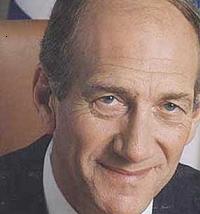Ehud Olmert swears an oath to slash settlement spending, Mofaz tells incoming Hamas prime minister to watch his back
Acting Prime Minister Ehud Olmert vowed on Tuesday that his Kadima Party would shave billions off settlement spending, while his defense minister advised the incoming Palestinian prime minister to fear for his life if Hamas militants start attacking Israel again.

Olmert's comments marked the first time he said explicitly he would scale back funding for Israel 's 40-year-old settlement enterprise, which has cost the state tens of billions of dollars.
Polls show Kadima significantly outstripping rivals in Israel 's March 28 elections.
Defense Minister Shaul Mofaz's warning to Hamas, recently elected to rule the Palestinian Authority, was the first to identify Hamas' prime minister-designate, Ismail Haniyeh, as a potential target for an Israeli pinpoint attack.
"No one is immune," Mofaz told Army Radio, a day after an Israeli air strike on an ice cream truck killed two Islamic Jihad militants and three bystanders in Gaza City . Two of those killed were children, ages eight and 14.
Olmert, in a speech in Tel Aviv, said "billions" in settlement spending would be diverted to Jerusalem and to the Negev Desert and Galilee , underdeveloped areas in southern and northern Israel .
"It's no secret that we won't invest in coming years the same sums we once invested in construction and infrastructure development in areas over the Green Line," Olmert said, referring to Israel 's frontier before the 1967 Mideast War.
Olmert took over from Ariel Sharon after the Israeli prime minister suffered a devastating stroke Jan. 4. Olmert spoke just days after his main security adviser, Avi Dichter, said Kadima plans more unilateral withdrawals in the West Bank and hopes to draw its final border within four years.
Kadima, formed by Sharon in November to push ahead territorial pullbacks, has been slipping in the polls, and the recent policy disclosures were seen as an attempt to shore up support. Reducing Israel 's presence in the West Bank after its summer pullout from the Gaza Strip is the key plank in Kadima's platform, and the party's main appeal to voters.
Settler leaders said Israel should invest more money in the settlements, not less.
"For the state of Israel to survive and exist, it has to deepen its presence and invest more in the settlements," said Noam Arnon, a spokesman for the small Jewish community in the West Bank city of Hebron .
Palestinian negotiator Saeb Erekat urged Israel to resume negotiations on a final peace deal immediately after the Israeli election.
"If they withdraw from the West Bank , and if we have the two-state solution, we can devote so many of the resources that now go to war and conflict, to reconciliation and peace," Erekat said.
Negotiations broke down years ago, and did not receive the hoped-for momentum from the Gaza withdrawal.
Prospects for renewing talks grew even dimmer after Hamas militants sworn to Israel 's destruction won January parliamentary elections, reducing the maneuvering power of Palestinian Authority President Mahmoud Abbas, who was elected separately last year and favors a negotiated accord.
Hamas, which is in the process of forming a Cabinet, has rejected international calls to renounce its violent, anti-Israel ideology, but has maintained a year-old moratorium on suicide bombings.
On Tuesday, Mofaz warned that Hamas leaders, including the incoming prime minister, Haniyeh, could be targets of pinpointed Israeli killings if the bombings resume, reports the AP.
D.M.
Subscribe to Pravda.Ru Telegram channel, Facebook, RSS!


